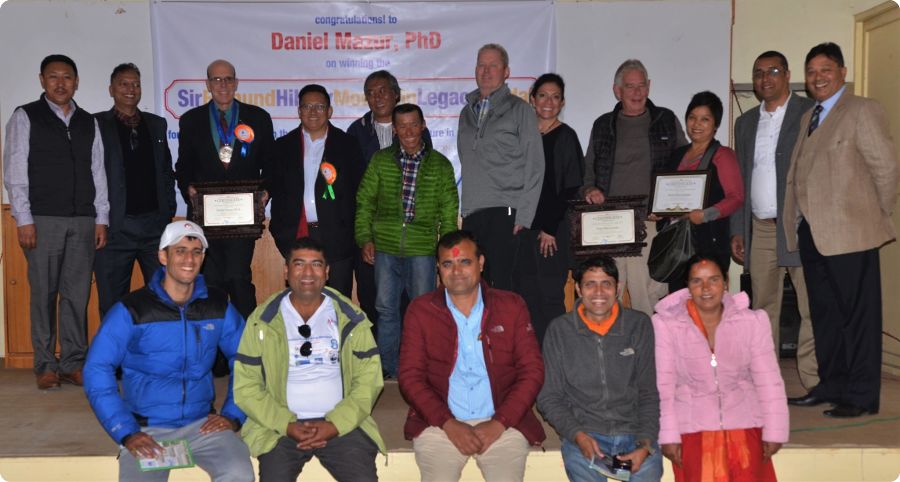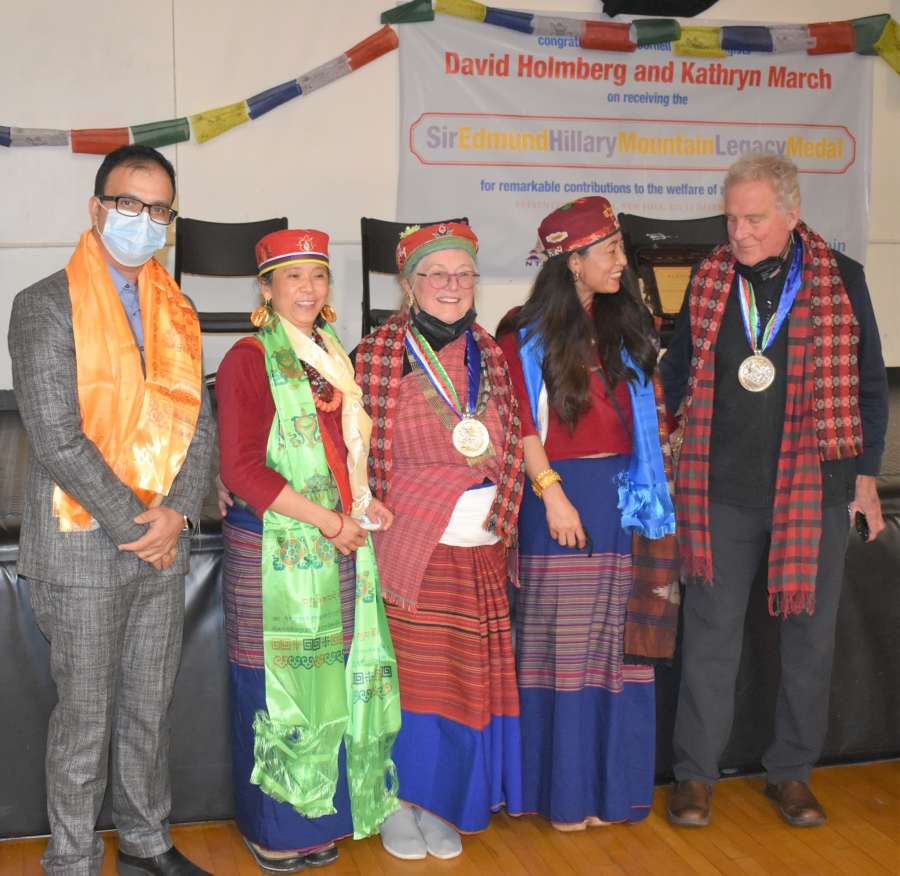
Mountain Legacy Update

December 11, 2021
Anthropologists David Holmberg and Kathryn March received Hillary Medals at a ceremony in Ithaca NY, USA. Ithaca Mayor Svante Myrick, Nepal's Consul General Bishnu Gautam, and anthropologist Alfred Pach participated Guests of Honor. More information

From left to right: Mountain Legacy President Kumar P. Mainali; Sujan Tamang; Kathryn March; Gopini Lama; David Holmberg

Sir Edmund Hillary
20 July 1919 – 11 January 2008
It's time for Hillary Day
On July 20 we celebrate the 90th birthday of Sir Edmund Hillary. Mountain Legacy is calling for a United Nations resolution to make this date an international celebration of Sport for Development and Peace.
In 1953, Edmund Hillary and Tenzing Norgay vaulted onto the international stage by completing the first ascent of Mt. Everest. Surprisingly, an event that has been etched in our collective consciousness as the ultimate human triumph on Earth gave rise to an achievement of far greater importance. Sir Edmund found in his Himalayan adventure and his subsequent celebrity the inspiration and the opportunity to "return the favor" by assisting the people who were his comrades on that climb, and by helping to protect their beautiful homeland. Through his personal efforts, and through the foundations that he helped establish in New Zealand, Canada, the United States, and Germany, Sir Edmund built some 30 schools, two airstrips, two hospitals, and 11 village clinics. He assisted in the restoration of monasteries, instituted scholarship and teacher training programs, and established reforestation projects in Khumbu, Mustang, and the Annapurna region. In every case, Sir Edmund undertook projects at the specific request of the local residents.
In recognition of Sir Edmund's life-long commitment to the welfare of mountain people and their environment and in the hope of inspiring others to emulate his example, Mountain Legacy initiated the Sir Edmund Hillary Mountain Legacy Medal both recognizes Sir Edmund's life-long commitment to the welfare of mountain people and their environment and also encourages the continuing emulation of his example. It is awarded for remarkable service in the conservation of culture and nature in mountainous regions.
We note that Jeanette Fitzsimons, New Zealand Member of Parliament and co-leader of the Green Party, has proposed commemorating Sir Edmund Hillary Day annually in New Zealand. Fitsimons' goal, to promote participation in sports, is certainly worthwhile. (See her article of January 14, 2008.) However, Sir Edmund's legacy goes beyond recreational sport.
Hillary's philanthropic achievements deserve the wider attention and the emulation that would come with a United Nations resolution that his birthday be dedicated to the theme of sport for development and peace. The Mandate page ("What does sport have to do with the UN?"), explains this theme in terms of the direct benefits of sports:
Sport can contribute to economic and social development, improving health and personal growth in people of all ages --particularly those of young people. Sport-related activities can generate employment and economic activity at many levels. Sport can also help build a culture of peace and tolerance by bringing people together on common ground, crossing national and other boundaries to promote understanding and mutual respect.
Hillary's life, however, illustrates another important connection between sport, development and peace. Outdoor sports can generate an interest in protecting the environment and the communities that make the sport possible. Most of us who work (whether professionally or on a volunteer basis) for the protection of mountain ecosystems and the prosperity of mountain communities were sucked in as a result of a prior interest in mountain sports. Some, like Junko Tabei, were world-class climbers; others, like Tony Freake, were trekkers. Many, like Jack Ives and Alton Byers, chose academic fields that allowed them to combine their love of mountain adventure with research and development that make important contributions to the welfare of mountain communities.
What about Partourism? and a Sherpa Development Corps?
"Sport for Development and Peace" is, of course, a sub-phenomenon of "recreation for development and peace," which naturally includes tourism in general. We believe that there should be much broader practice of partourism (participatory tourism), a variety of ecotourism that places the emphasis not simply on learning but on getting involved and staying involved with a particular destination. The Sherpas of Nepal, of course, are experts at partourism development, and it is to their credit that so many trekkers and climbers have become lifelong friends and collaborators. Wouldn't it be great if we could organize a Sherpa Development Corps, small multidisciplinary cadres including at least one Sherpa entrepreneur, who would pair up with remote communities and assist them in developing their own partourism industry?
Contact
Do you have suggestions or other feedback? Contact Mountain Legacy Projects Coordinator Seth Sicroff at sicroff@mountainlegacy.org
511 W. Green St., Ithaca NY, 14850 USA; (607) 256-0102.